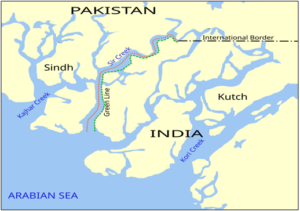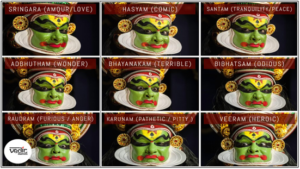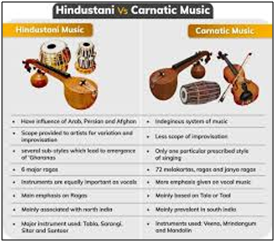Archives
(PRELIMS Focus)
Category: International Relations
Context:
- Defence Minister Rajnath Singh warned Pakistan that “any aggression by Pakistan in the Sir Creek area will be met with a resounding response that will change both history and geography.”
About Sir Creek:

- Disputed area: Sir Creek is a 96-km strip of water disputed between India and Pakistan in the Rann of Kutch marshlands.
- Nomenclature: Originally named Ban Ganga, Sir Creek is named after a British representative.
- Acts as a boundary: The Creek opens up in the Arabian Sea and roughly divides the Kutch region of Gujarat from the Sindh Province of Pakistan.
- Importance: Apart from strategic location, Sir Creek’s core importance is fishing resources. Sir Creek is considered to be among the largest fishing grounds in Asia.
- Possibility of oil and gas: The area has possible presence of great oil and gas concentration under the sea, which are currently unexploited thanks to the impending deadlock on the issue.
- Background of dispute:
- The dispute lies in the interpretation of the maritime boundary line between Kutch and Sindh.
- Pakistan claims the entire creek as per paragraphs 9 and 10 of the Bombay Government Resolution of 1914 signed between then the Government of Sindh and Rao Maharaj of Kutch, which set the boundary as the eastern flank of the creek popularly known as Green Line.
- But India claims that the boundary lies mid-channel as depicted in another map drawn in 1925, and implemented by the installation of mid-channel pillars back in 1924. In its support, it cites the Thalweg Doctrine in International Maritime Law, which states that river boundaries between two states may be divided by the mid-channel if the water-body is navigable.
- UNCLOS favours India’s stand: Acceding to India’s stance would mean shifting of the land/sea terminus point several kilometres to the detriment of Pakistan, leading in turn to a loss of several thousand square kilometres of its Exclusive Economic Zone under the United Nations Convention on Law of the Sea (UNCLOS).
Sources:
Category: History & Culture
Context:
- Kerala Kalamandalam, Cheruthuruthy, witnessed history when 16-year-old Sabri, became the first Muslim girl to perform Kathakali at the prestigious institution since its founding in 1930.
About Kathakali:

- Origin: Kathakali emerged in the 17th century in the kingdom of Travancore (present-day Kerala). The art form was initially performed in temple precincts and later gained popularity in the royal courts.
- Based on ancient texts: Kathakali is based on Natya Shastra, the ancient treatise on dance, written by Sage Bharata. However, It relies on Hasthalakshana Deepika, another classical text for its hand gestures.
- Precursors: Dance-drama art form called ‘Krishnanattam’ and Ramanattam based on Mahabharata and Ramayana are precursor of ‘Kathakali’.
- Composition: Kathakali combines elements of dance, music, mime, and drama.
- Features of dance: The four aspects of abhinaya – Angika, Aharya, Vachika, Satvikaand the Nritta, Nritya and Natya are combined perfectly in this dance form.
- Features of music: Kathakali music follows the traditional sopana sangeet of Kerala. It is said to be the ritual singing of the Ashtapadis on the flight of steps leading to the sanctum sanctorum.
- Use of Mudras: The movements are highly stylized and include intricate footwork, rhythmic swaying, and various hand gestures called mudras.
- Emphasis on facial expressions: The dancers use their facial expressions, known as rasas, to convey emotions and tell stories.
- Downfall in 20th century: Kathakali was in peril and on the verge of extinction in the beginning of 20th century.
- Revival: Renowned Poet Vallaththol Narayana Menon and Manakkulam Mukunda Raja took the initiative to set up Kerala Kalamandalam, a centre of excellence for classical art forms for the revival of kathakali.
- Major exponents: Kavungal Chathunni Panicker and Kalamandalam Gopi are its most eminent representatives.
Source:
Category: History & Culture
Context:
- Thumri (one of the ten main styles of singing in Hindustani music) lost its voice as Pandit Chhannulal Mishra passed away leaving a musical legacy.
About Hindustani Music:
- Origin: While the historical roots of both the music types belong to the Bharata’s Natyasastra, they diverged in the 14th century.
- Focus: The Hindustani branch of music focuses more on the musical structure and the possibilities of improvisation in it. The Hindustani branch adopted a scale of Shudha Swara Saptaka or the ‘Octave of Natural notes’.
- Composition: The Hindustani music has elements of ancient Hindu tradition, Vedic philosophy and Persian tradition as well.
- Based on teacher-disciple tradition: Since ancient times, it has been passed from one to another through the Guru-Shishya Parampara.
- Musical instruments: The musical instruments used in Hindustani are Tabla, Sarangi, Sitar, Santoor, Flute and violin.
- Raga system: It is based on the Raga system. The Raga is a melodic scale comprising of basic seven notes.
- Major styles: There are ten main styles of singing in Hindustani music like the Dhrupad, Khayal, Tappa, Chaturanga, Tarana, Sargam, Thumri and Ragasagar, Hori and Dhamar.
About Thumri:

- Origin: Originated in Eastern Uttar Pradesh, mainly in Lucknow & Benares, around 18th century. A romantic & erotic style of singing; also called “the lyric of Indian classical music.”
- Themes: Compositions are mostly on love, separation and devotion.
- Distinct feature: Erotic subject matter portrayed picturesquely from the various episodes of the lives of Lord Krishna & Radha.
- Language: Lyrics are typically in Brij Bhasha and are usually romantic & religious.
- Linkage with Khayal: A Thumri is usually performed as the last item of a Khayal concert.
- Gharanas: Three main gharanas of thumri are Benaras, Lucknow and Patiala.
- Exponent: Begum Akhtar is one of the most popular singers of thumri style.
Source:
Category: Government Schemes
- Context:
- Recently, Integrated Child Development Services (ICDS) scheme completed 50 years of its launch.
About ICDS:

-
- Launch: Launched in 1975, it is one of the world’s largest programmes providing for an integrated package of services for the holistic development of the child.
- Ministry: The Umbrella ICDS is a centrally sponsored scheme implemented by the Ministry of Women and Child Development.
- Flagship programme: The ICDS Scheme providing for supplementary nutrition, immunization and pre-school education to the children is a popular flagship programme of the government.
- Major objectives:
- To improve the nutritional and health status of children in the age-group 0-6 years.
- To lay the foundation for proper psychological, physical and social development of the child.
- To reduce the incidence of mortality, morbidity, malnutrition and school dropout.
- To achieve effective coordination of policy and implementation amongst the various departments to promote child development.
- To enhance the capability of the mother to look after the normal health and nutritional needs of the child.
- To facilitate, educate and empower Adolescent Girls (AGs) so as to enable them to become self-reliant and aware citizens.
- Various schemes subsumed: Presently, various government schemes have been subsumed under the Umbrella ICDS.
Various schemes under ICDS:
- Anganwadi Services Scheme:
- It is a unique programme for early childhood care and development.
- The beneficiaries under the Scheme are children in the age group of 0-6 years, pregnant women and lactating mothers.
- It provides a package of six services namely supplementary nutrition, pre-school non-formal education, nutrition & health education, immunisation, health check-up and referral services.
- Pradhan Mantri Matru Vandana Yojana:
- It provides cash incentive amounting to Rs.5,000/- in three instalments directly to the Bank/Post Office Account of Pregnant Women and Lactating Mother (PW&LM) in DBT (Direct Benefit Transfer) Mode during pregnancy and lactation in response to individual fulfilling specific conditions.
- National Creche Scheme:
- It provides day care facilities to children of age group of 6 months to 6 years of working women.
- The facilities are provided for seven and half hours a day for 26 days in a month.
- POSHAN Abhiyaan:
- It targets to reduce the level of stunting, under-nutrition, anaemia and low birth weight babies by reducing mal-nutrition/undernutrition, anaemia among young children as also, focus on adolescent girls, pregnant women and lactating mothers.
Source:
Category: Defence & Security
Context:
- Russian President Vladimir Putin said that a decision by the United States to supply Tomahawk missiles to Ukraine would trigger a major new escalation with Washington.
About Tomahawk Missiles:
- Development: It is a long-range, subsonic cruise missile developed by the United States Navy.
- Launch: It is launched from ships or submarines through a Vertical Launch System and used for precision strikes on land-based targets.
- Range: These missiles have a range between 1,000 and 1,500 miles (1,550 to 2,500 km).
- Structure: Tomahawks measure 18.3 feet in length and weigh about 3,200 pounds. They carry a 1,000-pound conventional warhead or cluster munitions.
- Uniqueness: Tomahawks can fly at low altitudes, avoiding radar detection, and are guided by advanced GPS, inertial navigation, and terrain contour mapping. : This makes them highly accurate-with a margin of error of just 10 meters.
- Deceptive: It is built to follow a non-linear path, reducing the chance of interception. It is further powered by a solid propellant during its launch phase. Thereafter, it is powered by a turbofan engine that does not emit much heat, which makes infrared detection difficult.
- Past uses: Tomahawks were first deployed in combat during Operation Desert Storm in 1991. Since then, they have been used in several major conflicts, including strikes in Syria in 2017.
(MAINS Focus)
Introduction (Context)
Artificial intelligence, drones, and hybrid warfare are lowering the cost of conflict but increasing operational risks. In a two-front threat scenario from China and Pakistan, India must shift from coordination to command through integrated theatre commands backed by structural reforms.
From Coordination to Command
- New Rules of 2025: The Inter-Services Organisations (Command, Control and Discipline) Rules empower joint commanders with authority across services, moving beyond silos.
- Prime Minister’s Push: At the 2025 Combined Commanders’ Conference, the theme of “Year of Reforms” stressed integrated theatre commands as the future of Indian defence.
- Tri-Service Agencies: Cyber, Space, and Special Operations divisions have been raised under HQ IDS, enhancing India’s preparedness for new-age domains.
- Combat Formations: Rudra and Bhairav units integrate artillery, armour, engineers, and surveillance for modular, mission-specific deployment.
- Amphibious Doctrine: A declassified joint doctrine now provides an integrated framework for land, sea, and air operations.
Doctrinal and Technological Evolution
- Earlier Doctrines: The Joint Doctrine (2017) and Land Warfare Doctrine (2018) laid the groundwork for synergy among the three services.
- Ran Samvad Seminar (2025): Emphasised hybrid warriors—capable of coding, information warfare, and tactical command—reflecting the demands of multi-domain conflict.
- Technology Induction:
- MQ-9B drones (2023 deal) enhance persistent ISR and precision strike.
- Rafale-M strengthens naval aviation and maritime strike power.
- Akashteer AI system integrates Army air defence with IAF’s IACCS.
- Pralay missile adds credible theatre-level firepower.
Creating a Modern Force
- Integrated Battle Groups (IBGs): Rudra-type brigades designed for 12–48 hour deployment with combined arms, drones, and loitering munitions.
- Maritime Posture: A carrier-centred strategy is being developed; Rafale-M supports near-term aviation while a 15-year naval roadmap expands subsurface and unmanned capacity.
- Standardisation: Future force requires common data and interface systems across all services.
- Professional Military Education: PME must embed technologist-commanders into exercises, ensuring adaptability and joint leadership.
Challenges and Drawbacks
- Slow Reform Pace: Despite a decade of emphasis, joint PME began only in 2024; China achieved theatre commands in 2016.
- Untested Jointness: Exercises like Operation Sindoor were largely aerial, never testing full mobilisation.
- Inter-Service Rivalries: Persistent disagreements over jurisdiction delay full implementation of theatre commands.
- Import Dependence: Key systems such as Rafale-M and MQ-9B highlight reliance despite Atmanirbhar Bharat.
- Weak Defence–Industry Links: The CAG (2022) flagged delays in DRDO projects, slowing indigenous modernisation.
Reforms and Way Forward
- Phased Theatrisation: Begin with functional commands (cyber, space), then expand geographically, similar to the US Goldwater-Nichols Act (1986).
- Strengthen PME: Train hybrid technologist-commanders skilled in AI, coding, and information warfare.
- Civil–Military Fusion: Deepen collaboration between DRDO, DPSUs, private startups, and universities via iDEX and Defence Acquisition Procedure 2020.
- Expand IBGs: Convert trial brigades into permanent formations with joint logistics and firepower.
- Industrial Ecosystem: Build DARPA-style rapid testing and prototyping cycles to accelerate indigenous defence innovation.
Conclusion
India must move beyond incremental coordination to genuine joint command. By activating theatre commands, reforming PME, and strengthening civil–military fusion, India can build a flexible and adaptive force capable of winning 21st-century hybrid and multi-domain wars.
Mains Question
- Examine India’s move towards integrated theatre commands. How can reforms in doctrine, technology, and force structure prepare India for a possible two-front war? (250 words, 15 marks)
Introduction (Context)
India’s digital revolution—driven by affordable internet, UPI payments, and e-commerce—has increased financial inclusion but also opened avenues for cybercrime. Rising phishing scams, identity theft, UPI/OTP frauds, and “digital arrests” expose systemic gaps in banks and cyber policing.
Security Challenges in India’s Digital Transformation
- Social engineering at the core: Fraudsters manipulate fear, urgency, or trust rather than relying only on hacking. Elderly, rural populations, and job/loan seekers are most vulnerable.
- Rise of digital arrests: Criminals impersonate officials, threaten fake charges, and coerce large payments (e.g., ₹23 crore fraud of a retired banker).
- Systemic gaps: Banks miss red flags such as unusually large transactions and mule accounts with weak KYC, while cyber police lack tools and manpower.
- Underreporting of frauds: Many victims avoid complaints due to stigma or lack of trust, allowing fraudsters to thrive unchecked.
- Organised patterns: Layering of money through multiple accounts makes recovery nearly impossible, especially when the crucial 24-hour window is missed.
Criticisms and Institutional Weaknesses
- Banks’ limited role: Restrict themselves to issuing generic advisories instead of proactive prevention.
- Weak KYC enforcement: Mule accounts with fake or incomplete details facilitate laundering.
- Cyber police constraints: Severely short of technology, trained workforce, and real-time coordination.
- Delayed responses: By the time fraud is reported and acted upon, funds are already dispersed.
- Data insecurity: Leaked customer data often circulates, exposing citizens to repeated fraud attempts.
Reforms and Way Forward
- AI-driven monitoring: Create personalised transaction profiles and anomaly detection to flag unusual size, frequency, or timing of transfers.
- Cross-institutional collaboration: An AI-enabled fraud intelligence network across banks, payment systems, and telecom providers for real-time alerts.
- Empowering cyber police: 24/7 rapid-response units with automated AI alerts to act within the 24-hour window.
- Strengthening banks’ accountability: Audit mule accounts, plug KYC gaps, use Blockchain for tamper-proof data, and ensure timely customer compensation (RBI guidelines).
- Global cooperation: Cybercrime is transnational; India must strengthen cross-border intelligence-sharing and legal frameworks for effective action.
Conclusion
India’s digital economy cannot thrive without trust. By shifting from reactive firefighting to AI-enabled proactive protection, strengthening bank accountability, and empowering cyber police, India can secure its digital transformation and safeguard citizens from escalating cyber fraud.
Mains Question
- Cyber frauds are rising in India with the growth of digital transactions. What challenges do social engineering-based crimes pose, and what reforms are needed to protect citizens? (250 words, 15 marks)
Introduction (Context)
For Gandhi, courage was not dramatic defiance but discipline, self-mastery, and loyalty to principles higher than fear or comfort. His life episodes — from plague service to Noakhali peace marches — illustrate quiet moral courage in action.
Courage in Public Service
- Plague Relief in Johannesburg (1904): Gandhi nursed abandoned plague victims despite infection risks. His choice reflects selflessness and the ethical value of putting community welfare above personal safety.
- Noakhali Riots (1946): Gandhi walked barefoot through riot-torn villages without police protection. His reliance on truth and non-violence restored peace, showing the role of moral authority in conflict resolution.
- Facing Assassination Attempts: Even after bomb and knife attacks, Gandhi refused police protection, showing fearlessness and adherence to ahimsa (non-violence).
Moral Integrity in Personal Life
- Kasturba’s Health Crisis: Gandhi respected his wife’s conviction as a vegetarian, refusing to override her conscience even at the risk of her life. This highlights respect for individual autonomy and moral integrity.
- Ashram and Untouchability: He admitted an “untouchable” family into his Ahmedabad ashram despite financial backlash. His stand for equality demonstrates courage in resisting societal prejudice.
- Family Discipline: Gandhi punished his son Manilal for disobeying ashram rules, proving impartiality in enforcing discipline, even against personal relationships.
Ethical Values Demonstrated
- Integrity: Principles were non-negotiable even under personal loss.
- Empathy: Care for plague victims and riot survivors reflected compassion in action.
- Moral Courage: Choosing right action despite risks to life, family, and reputation.
- Justice and Equality: Opposition to untouchability exemplified fairness and inclusivity.
- Self-Discipline: Practised simplicity, restraint, and personal accountability as foundations of ethical leadership.
Relevance for Ethics in Governance
- Administrators today must show courage of conviction, upholding fairness even against popular or political pressure.
- Respecting diverse beliefs and individual conscience builds trust in public institutions.
- Like Gandhi, civil servants must practise discipline and impartiality, ensuring rules apply equally to all.
- Non-violence and dialogue as tools of conflict resolution remain relevant in communal harmony and public order management.
- Gandhi’s courage shows that ethical authority can be more powerful than positional authority in leadership.
Conclusion
Gandhi’s quiet courage lay in standing by truth, justice, and compassion regardless of consequence. For public administrators, his example underlines that ethical leadership requires inner strength, impartiality, and integrity — qualities essential for governance in a diverse democracy.
Mains Question
- Mahatma Gandhi’s life was a demonstration of quiet moral courage rather than dramatic defiance. Discuss how such courage is essential for ethical leadership and public administration in India today. (150 words, 10 marks)
